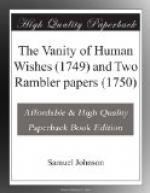Publication Number 22 (Series VI, No. 2)
Los Angeles
William Andrews Clark Memorial Library
University of California
1950
GENERAL EDITORS
H. Richard Archer, Clark Memorial Library
Richard C. Boys, University of Michigan
Edward Niles Hooker, University
of California, Los Angeles
H.T. SWEDENBERG, Jr., University of California,
Los Angeles
ASSISTANT EDITORS
W. Earl Britton, University of Michigan
John Loftis, University of California,
Los Angeles
ADVISORY EDITORS
EMMETT L. AVERY, State College of Washington
BENJAMIN BOYCE, University of Nebraska
LOUIS I. BREDVOLD, University of Michigan
CLEANTH BROOKS, Yale University
JAMES L. CLIFFORD, Columbia University
ARTHUR FRIEDMAN, University of Chicago
SAMUEL H. MONK, University of Minnesota
ERNEST MOSSNER, University of Texas
JAMES SUTHERLAND, Queen Mary College, London
INTRODUCTION
The pieces reproduced in this little volume are now beginning to bid for notice from their third century of readers. At the time they were written, although Johnson had already done enough miscellaneous literary work to fill several substantial volumes, his name, far from identifying an “Age”, was virtually unknown to the general public. The Vanity of Human Wishes was the first of his writings to bear his name on its face. There were some who knew him to be the author of the vigorous satire, London, and of the still more remarkable biographical study, An Account of the Life of Mr. Richard Savage; and a few interested persons were aware that he was engaged in compiling an English Dictionary, and intended to edit Shakespeare. He was also, at the moment, attracting brief but not over-favorable attention as the author of one of the season’s new crop of tragedies at Drury Lane. But The Vanity of Human Wishes and The Rambler were a potent force in establishing Johnson’s claim to a permanent place in English letters. The Vanity appeared early in January, 1749; The Rambler ran from March 20, 1749/50 to March 14, 1752. With the exception of five numbers and two quoted letters, the periodical was written entirely by Johnson.
As moral essays, the Ramblers deeply stirred some readers and bored others. Young Boswell, not unduly saturnine in temperament, was profoundly impressed by them and determined on their account to seek out the author. Taine, a century later, discovered that he already knew by heart all they had to teach and warned his readers away from them. Generally speaking, they were valued as they deserved by the




